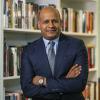The post-9/11 world has not established new international rules as much as it has reinvigorated, expanded and normalised global patterns of control.
At the close of two full decades after the 11 September 2001 attacks on the United States, lasting changes in the configuration of global affairs have cemented. It is a historical commonplace to stress the transformative nature of given periods – particularly so at the occasion of the twilight of centuries or after lengthy conflicts, such as the Cold War.
“9/11” was, however, an unambiguously watershed moment.
The wars that followed Al Qaeda’s attack on New York and Washington – in Afghanistan, Iraq, the Sahel, East Africa and the Levant –, as well as the so-called Global War on Terrorism, cost the lives of half a million people and ushered a new era characterised primarily by the militarisation of international relations.
Many of the early givens can today be dismissed – witness the US Saigon sequel in Kabul. Round the world, this pattern solidified, in time coming full circle to enable a similar martial logic in domestic spaces. Succumbing to the normalisation and routinisation of securitisation, the world gradually became used to the tropes of a fetishised security language that had successfully used disorder to generate a new order.
By the early 2010s – as a new generation was being socialised into them – the defining contours of the emerging new era were fast coalescing. Amidst the simmering strategic cacophony, brutality and societal dislocation, an era of irresolution and perplexity was forging ahead.
On its face promising safety and personal empowerment, the new tech-driven, neoliberal grammar-of-things was in reality increasingly dispossessive. These were then the staccato years of war, terrorism, financial crisis, migration emergency, humanitarian disaster, social protest, neo-authoritarianism and pandemic, all woven in a patchwork of moral quagmires and entangled ethical knots.
Gone were the positive creative transgressions and sense of renewal of the 1990s in pursuit of good governance, human security and political liberalisation.
To be sure, the concomitant steely determination of many round the world in the name of the environment, gender equality, democratic accountability, global health, racial justice and human rights has been present with increasing urgency, and a measure of success.
In hindsight, however, global politics have problematically become contaminated by an all-pervasive and self-justifying authoritarianism now too easily lodged in the interstices of policy. What the 2020s hold next is unclear.
To a large extent, the COVID-19 pandemic ended the post-11 September era. The next phase opens on sites of destabilisation and the ruins of toxic mistrust. All the same, such estrangement merely ushers a challenge of recreation and mutual building, which can be taken up, away from the violent tribalised world we inhabited these past two decades.
Mohammad-Mahmoud Ould Mohamedou is the recipient of the 2021 Global South Distinguished Scholar Award of the International Studies Association (ISA).
This article was published in Globe #28.
GENEVA GRADUATE INSTITUTE
Chemin Eugène-Rigot 2A
Case postale 1672
CH - 1211 Geneva 1, Switzerland
+41 22 908 57 00
ADMISSIONS
prospective@graduateinstitute.ch
+ 41 22 908 58 98
MEDIA ENQUIRIES
sophie.fleury@graduateinstitute.ch
+41 22 908 57 54
ALUMNI
carine.leu@graduateinstitute.ch
+ 41 22 908 57 55



